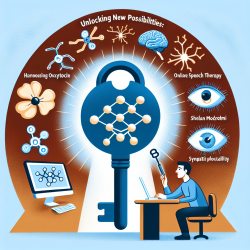Introduction
In the field of speech-language pathology, data-driven decisions are crucial for creating effective interventions and improving outcomes. A recent study titled The Roles of Personal and Environmental Resources in Predicting Work–Family Facilitation and Mental Health among Employed Parents of Children with Disabilities in Croatia offers valuable insights into the factors that can enhance the mental health and work-family balance of employed parents of children with disabilities. This blog explores the key findings and their implications for practitioners, particularly those providing online therapy services like TinyEYE.
Key Findings
The study involved 571 employed parents of children with disabilities in Croatia and identified several predictors of work-to-family (WFF) and family-to-work facilitation (FWF), as well as mental health. The research found:
- Higher WFF was predicted by social support at work, education level, personal strength, and recovery management.
- Higher FWF was associated with family social support, personal strength, emotional regulation strategies, optimism, and demographic factors such as age and gender.
- Mental health was directly predicted by optimism, recovery management, FWF, emotional regulation strategies, and the number of children.
Implications for Practitioners
For practitioners working with families of children with disabilities, these findings emphasize the importance of fostering a supportive environment both at work and home. Here are some actionable steps:
- Enhance Social Support: Encourage organizations to provide robust support systems for employees, which can positively impact their family life.
- Promote Emotional Regulation: Incorporate strategies in therapy sessions that help parents manage emotions effectively, contributing to better mental health and family dynamics.
- Focus on Personal Strengths: Help parents recognize and build on their personal strengths, fostering resilience and posttraumatic growth.
- Encourage Optimism: Develop interventions that cultivate a positive outlook, which has been shown to enhance mental health.
Encouraging Further Research
While this study provides valuable insights, it also highlights the need for further research, particularly in different cultural contexts and with more diverse populations. Practitioners are encouraged to explore these areas and contribute to the growing body of knowledge on work-family facilitation and mental health among parents of children with disabilities.
To read the original research paper, please follow this link: The Roles of Personal and Environmental Resources in Predicting Work–Family Facilitation and Mental Health among Employed Parents of Children with Disabilities in Croatia.










